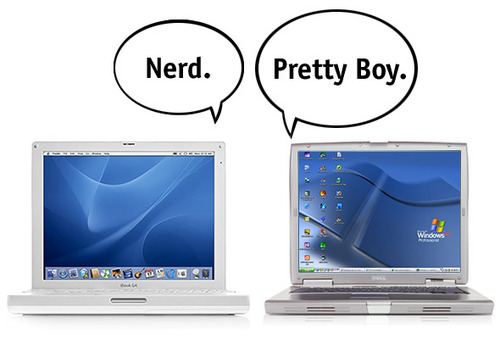
Sure, there are a lot of similarities. Only Apple is producing devices running iOS, just like they did not want to licence their Mac operating system to OEMs. Google is licensing Android freely, and most noteable OEMs are focusing on Android (apart from Nokia and Blackberry), just like the case was with Microsoft Windows. If you subscribe to this logic, you probably think that Android will eventually end up with 80-90% market share, while Apple in the end will serve 10-15% of the market (the high-end).
There is one difference, though. A big one. In fact, it changes everything. There are virtually no switching costs any more. Most services people use on their mobile devices and tablets, both for work and personal, are based in the cloud. The app you have on your phone is basically a shell for accessing those cloud services, and most apps are available for both platforms. They are platform neutral. So it doesn't matter if your colleagues use the one or the other, you can still collaborate using the same services.
While the lower end of the smartphone market is likely to expand rapidly in the time to come, a lot of people will also be able to afford more expensive phones. And a lot of those people will probably choose an Apple product. And as long as a lot of consumers still prefer an iPhone, they will still buy an iPhone, even if it's used for work. Remember the BYOD trend?
You should probably see my argument in light of Ben Thompson's critique of Clayton Christensen's theory of low-end disruption.
THE FLAW IN THE THEORY
Interestingly, Christensen himself laid out his theory’s primary flaw in the first quote excerpted above (from 2006):
You also see it in aircrafts and software, and medical devices, and over and over.
That is the problem: Consumers don’t buy aircraft, software, or medical devices. Businesses do.
Christensen’s theory is based on examples drawn from buying decisions made by businesses, not consumers.5The reason this matters is that the theory of low-end disruption presumes:
- Buyers are rational
- Every attribute that matters can be documented and measured
- Modular providers can become “good enough” on all the attributes that matter to the buyers
All three of the assumptions fail in the consumer market, and this, ultimately, is why Christensen’s theory fails as well.
Anyway, predicting market shares multiple years from now is next to impossible, but my guess is that iOS likely will stabilize around 30% worldwide, if not even higher.